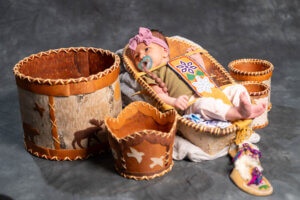By Lauren Wise, TCC PharmD
 Respiratory Syncytial Virus, or RSV, is a common virus that affects the lungs. RSV starts in the fall and peaks in the winter, alongside other infections such as the flu and COVID-19. RSV is spread when an infected person coughs or sneezes, or from direct contact such as by touching a doorknob or kissing an infant.
Respiratory Syncytial Virus, or RSV, is a common virus that affects the lungs. RSV starts in the fall and peaks in the winter, alongside other infections such as the flu and COVID-19. RSV is spread when an infected person coughs or sneezes, or from direct contact such as by touching a doorknob or kissing an infant.
Why should I care?
RSV can be a very dangerous infection for the vulnerable people in your life. RSV is the leading reason infants are hospitalized in the United States. Each year, over 80,000 children have to go to the hospital because of RSV. In Alaska, children experience rates of RSV that are seven times higher than the national average for children.
How do I know my child has RSV?
Your healthcare provider can easily check for RSV, along with other common respiratory viruses like flu and COVID-19, with a nasal swab. RSV may not be severe when a child first comes in contact, but it can become more severe a few days later. Children may have runny noses, they may eat and drink less, and they can develop a cough and difficulty breathing. Very young infants (less than 6 months old) may seem more irritable, have decreased activity, or make more grunting noises. Children may or may not have a fever, too.
How can I protect my infant?
Infants can be protected from RSV with immunizations, which helps to prevent severe illness from RSV exposure. During RSV season, infants can receive an immunization in two ways: either from a maternal vaccine given in late pregnancy, or from protective antibodies given shortly after birth. Older children who are less than 20 months of age and who are at risk can also receive protective antibodies. These immunizations provide protection that lasts about 5 to 6 months.
What else can I do to keep my baby safe?
Practice good hygiene, like covering coughs and sneezes, washing hands frequently, and cleaning surfaces regularly in your home. If you’re feeling sick, stay home to recover and minimize the risk of spreading RSV, as it can lead to serious, life-threatening infections in others.
Check out these resources for more information:
- American Lung Association
- CDC – RSV Infection
- National Foundation for Infectious Diseases
- Healthychildren.org – Info for Alaska Native Families
Please reach out to your care provider for more information or to schedule an appointment.
